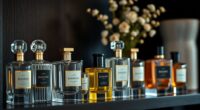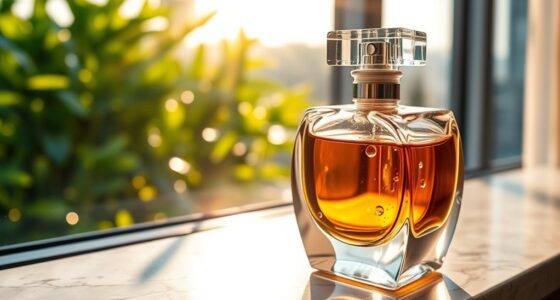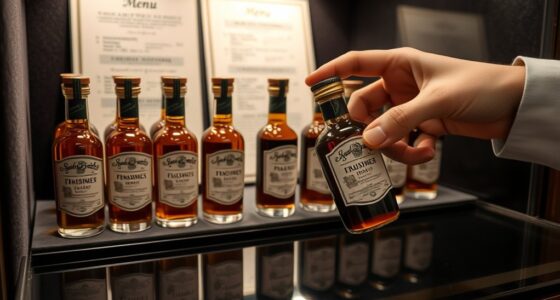Perfume oils typically last longer on your skin and offer a more intimate scent experience, making them perfect for all-day wear. Sprays provide immediate projection and broad coverage but tend to fade faster. Oils allow precise, personal application and are portable, while sprays are quick and convenient for volume and ease. To discover which fits your style best and access more scent secrets, explore the full comparison ahead.
Key Takeaways
- Perfume oils generally offer longer-lasting scents (6-12 hours) due to higher concentration and slower evaporation compared to sprays.
- Sprays provide immediate, voluminous projection but tend to fade faster, typically within 4-8 hours.
- Oils allow for precise, targeted application and blending, enhancing longevity and personal scent customization.
- Sprays are quick and convenient for broad coverage, making them ideal for casual, on-the-go use.
- The choice depends on preference for intimate, long-lasting scent (oils) versus quick, widespread diffusion (sprays).
The History and Cultural Significance of Oil Perfumes

Oil perfumes have a rich history dating back to ancient civilizations like Egypt, Greece, and Mesopotamia, where they played essential roles in rituals, ceremonies, and personal adornment. These cultures valued essential oils, often blending aromatic ingredients into complex oil perfumes crafted by traditional perfumers. The cultural significance of these fragrances extended beyond scent; they symbolized status, spirituality, and identity. In Middle Eastern societies, intricate blends of oud, rose, and jasmine formed sacred attars used in religious rituals and daily life. Royal courts in medieval Persia and caliphates stored luxurious oil distillates in ornate containers, emphasizing their importance. Despite the Western shift to alcohol-based perfumes, oil perfumes continue to hold cultural importance, especially in regions where they enhance rituals and performance, connecting tradition with personal expression. Tradition and personal expression remain central themes in the enduring appeal of oil perfumes across various cultures. Additionally, the art of blending essential oils has been refined over centuries, preserving their cultural and spiritual significance.
Comparing Longevity and Projection: Oil vs. Spray
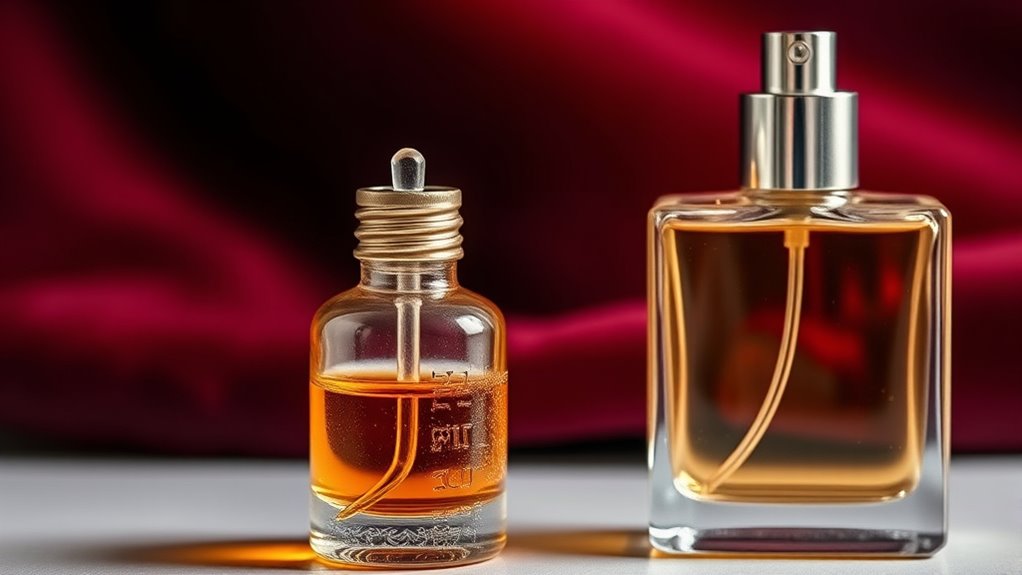
When choosing between perfume oils and sprays, understanding their differences in longevity and projection can help you select the right option for your preferences. Perfume oils typically last 6 to 12 hours due to their high fragrance concentration and slower evaporation rate, providing a more subtle, intimate scent. Sprays, especially alcohol-based ones, often project further initially but may fade after 4 to 8 hours. Consider these points:
- Longevity: Oils usually last longer because they evaporate more slowly. Additionally, the fragrance concentration in oils contributes significantly to their extended wear time. The composition of oils also affects how well they adhere to the skin and maintain their scent over time.
- Projection: Sprays deliver a stronger initial sillage, but oils offer a more personal, close-to-skin experience.
- Fragrance Dynamics: Oils release fragrance gradually, enhancing longevity, whereas sprays produce an immediate burst of scent followed by quicker evaporation. The evaporation rate of the fragrance plays a crucial role in how long a scent persists.
Your choice depends on whether you prefer lasting intimacy or immediate projection.
Application, Portability, and Personal Experience

Choosing between perfume oils and sprays depends on how easily you want to apply and carry your fragrance. Oils offer precise, direct application and are easy to take anywhere, while sprays provide quick, widespread coverage with less fuss. Your personal style and daily routine will help determine which method feels more natural for you. Additionally, considering the type of scent and its longevity can guide your choice, as certain formulations may last longer depending on their concentration and application method. Aesthetic appeal and sensory experience also play a role, with personal fragrance preferences enhancing your overall fragrance experience and personal connection. Furthermore, understanding how different product formats impact scent longevity can help you select the most suitable option for your needs. For example, some application techniques may influence how long the scent lasts or how it develops on your skin.
Ease of Application
Applying perfume oils offers precise control, often using a rollerball or fingertip to target specific areas, which allows you to customize the scent intensity and placement. This method provides a high level of precision, making it easy to apply the right amount without excess. In contrast, sprays deliver quick, even coverage over larger areas with minimal effort, thanks to their atomizer dispersal. To compare ease of application: 1. Oils allow for controlled, pinpoint application, ideal for intimacy and subtlety. 2. Sprays offer convenience with fast, broad dispersal, perfect for larger coverage. 3. Oils are portable and less prone to spills, while sprays are larger but require less frequent reapplication. Both methods have their advantages depending on your preference for control or convenience. Properly storing perfume oils and sprays in a cool, dry place can also help maintain their scent longevity and quality over time, especially when considering proper storage techniques for an optimal listening experience. Additionally, choosing the right application method can enhance your overall experience and ensure your fragrance lasts longer throughout the day. Using application techniques that suit your lifestyle can further optimize the longevity and scent distribution of your perfume, especially considering fragrance formulation, which influences how the scent interacts with your skin chemistry.
On-the-Go Convenience
Perfume oils excel in on-the-go convenience because they are small, portable, and spill-proof. You can easily carry them in your purse or pocket, making travel and daily touch-ups effortless. Unlike sprays, oils won’t leak or create messes, ensuring discreet application anytime, anywhere. Their compact size fits easily into your bag, and they’re airline-friendly due to the absence of aerosol components. Simply apply a small amount directly onto pulse points for a long-lasting scent that stays close to your skin. Whether commuting or traveling, oils provide a seamless, leak-proof experience, giving you confidence and convenience. Here’s a quick comparison:
| Feature | Perfume Oils | Sprays |
|---|---|---|
| Portability | Compact, travel-ready | Bulkier, less discreet |
| Application | Discreet, direct | Spraying, less precise |
| Leak-proof | Yes | No |
Sensory Personalization
Perfume oils offer a highly personalized scent experience because they allow for precise, close-to-skin application, which enhances intimacy and longevity. Your application method influences scent personalization by aligning with your skin chemistry and personal preference. For example:
- Applying oils on pulse points intensifies top notes and improves longevity.
- Using natural ingredients ensures a subtle, tailored scent that complements your skin’s unique chemistry.
- The portability of small rollerballs makes it easy to adjust your scent throughout the day, maintaining a personal connection with your fragrance.
- The customization options available with oils, such as blending different scents, allow for a truly unique and personal fragrance profile.
- Keeping a journal to track how different oils interact with your skin can help refine your signature scent over time.
- The application techniques for oils can significantly influence how long the scent lasts and how it develops throughout the day.
Oils provide a more intimate experience, adapting to your skin’s chemistry for a subtle, long-lasting effect. Sprays, by contrast, offer versatile projection but less personal control.
Ingredient Quality and Formulation Differences
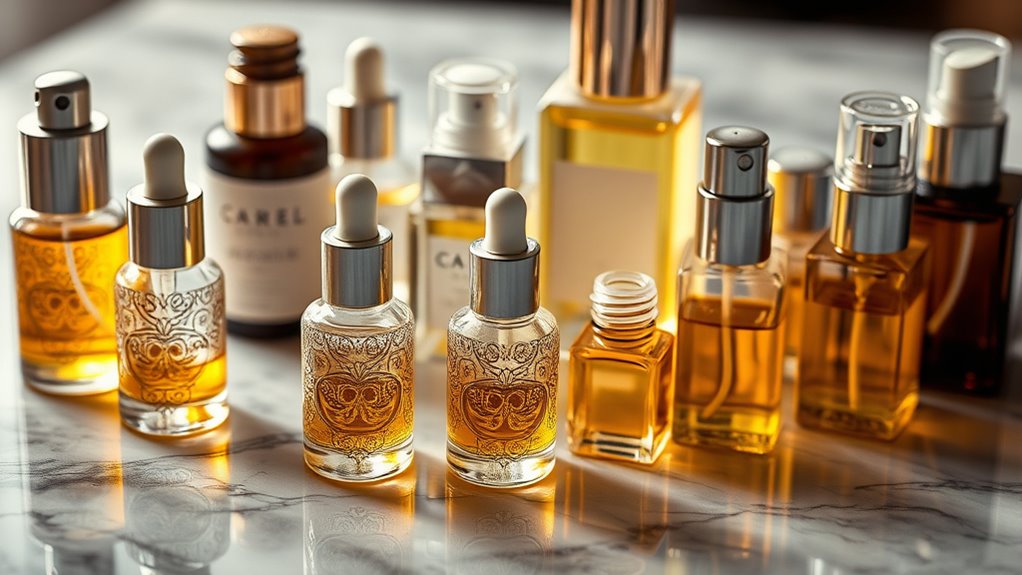
The quality of ingredients and how they’re formulated play a essential role in determining the overall scent experience. High-quality perfume oils use pure essential oils or well-blended synthetics, enhancing scent longevity and depth. Precise formulation techniques, such as selecting lightweight carrier oils like jojoba or fractionated coconut, prevent greasiness while boosting diffusion and persistence. Better ingredient quality reduces skin irritation and helps maintain scent stability over time. Artisanal oils often rely on minimal preservatives, preserving scent clarity with natural oils and high-grade synthetics. The table below illustrates key differences:
| Ingredient Quality | Formulation Techniques | Impact on Longevity |
|---|---|---|
| Natural oils | Use of carrier oils like jojoba | Enhances stability |
| Aromatic compounds | Concentration adjustments | Extends wear time |
| High-grade synthetics | Minimal additives | Improves scent projection |
Additionally, ingredient purity plays a crucial role in ensuring the consistent performance of perfume oils over extended periods. formulation process also influences how well the scent develops and endures on different skin types. A well-designed blend ratio ensures that the scent remains balanced and long-lasting throughout the day. Proper maceration techniques can further enhance the complexity and richness of perfume oils, contributing to a more luxurious scent experience. Incorporating these advanced formulation methods can significantly elevate the overall quality and longevity of perfume oils.
Addressing Safety, Sensitivity, and Environmental Impact
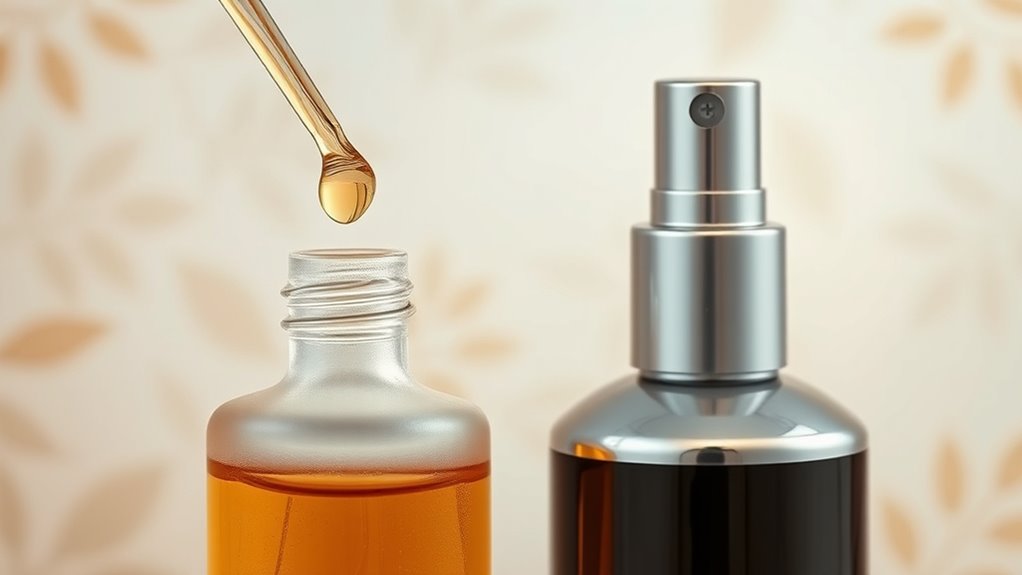
Both perfume oils and sprays are subject to strict safety standards to protect your skin and health. If you have sensitive skin, choosing products with gentle carrier oils or natural ingredients can minimize irritation. Brands are also making eco-friendly packaging choices, but it’s important to store your fragrances properly to guarantee safety and minimize environmental impact.
Skin Sensitivity and Reactions
When choosing between perfume oils and sprays, it’s important to contemplate how each type may affect sensitive skin. Perfume oils often contain natural ingredients like essential oils and carrier oils, which can cause allergic reactions or irritation, especially if synthetic or contaminated. Conversely, alcohol-based sprays tend to be less irritating because they lack oils and are formulated with dermatologically tested ingredients; however, alcohol can still cause dryness or irritation in some. Consider these points:
- Perfume oils with natural ingredients may trigger reactions in sensitive individuals.
- Sprays with hypoallergenic formulations reduce the risk of irritation.
- Always perform a patch test to identify potential sensitivities before full use.
Choosing fragrance formulations carefully helps minimize adverse reactions and supports skin safety.
Eco-Friendly Packaging Options
Have you considered how eco-friendly packaging options for perfume oils can enhance both safety and sustainability? Refillable glass bottles and biodegradable tins are popular choices that reduce plastic waste and their environmental impact. Refillable containers promote sustainability, lowering the risk of leaks and spills—ideal for travel or storage. Materials like recycled glass, bamboo, and plant-based plastics are increasingly used to create environmentally conscious packaging that’s both functional and stylish. These eco-friendly designs often incorporate minimal or biodegradable labeling and adhesives, further reducing ecological footprints. Choosing sustainable packaging also benefits sensitive skin, as it avoids harmful plastics and chemicals. By opting for eco-friendly options, you make a conscious decision to support the environment while ensuring your perfume remains safe and elegant.
Safety Regulations & Standards
Safety regulations and standards play a vital role in making sure that perfume oils and sprays are safe for consumers and environmentally responsible. You need to be aware that:
- The EU Cosmetics Regulation mandates ingredient evaluation, allergenicity assessment, and toxicity limits to protect consumer safety.
- Packaging warnings and hazard symbols are required to inform you about proper handling, storage, and potential risks.
- In the US, regulations like MoCRA continually update safety standards, emphasizing allergen labeling and ingredient transparency.
Both perfume oils and sprays undergo rigorous safety testing to meet these standards. This guarantees ingredients are within safe toxicity limits, allergenic components are clearly identified, and you’re informed about product use and precautions. These regulations help prevent adverse reactions and promote responsible manufacturing.
Finding Your Perfect Fragrance: Which Format Suits You Best
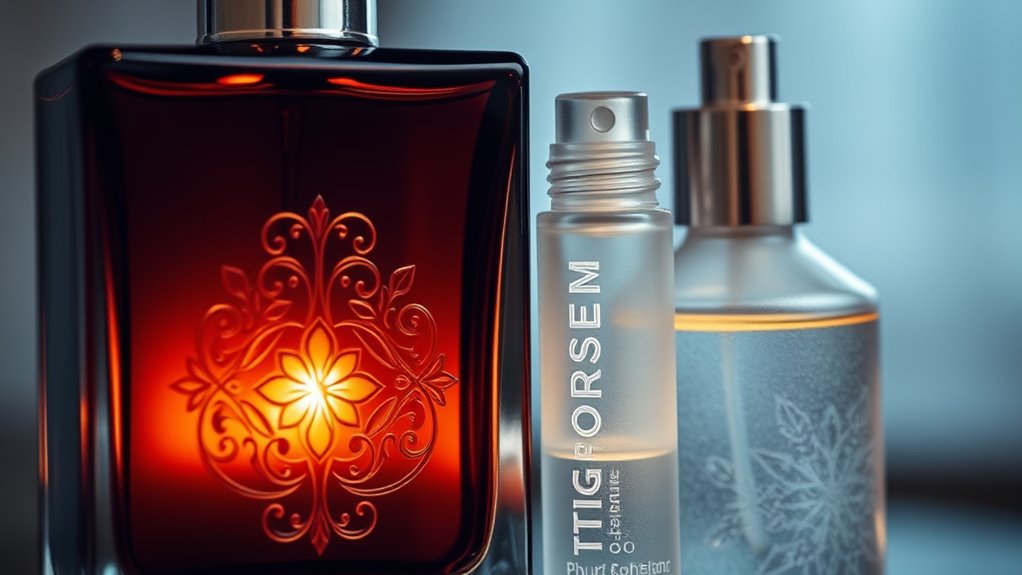
| Fragrance Format | Application Method | Best For |
|---|---|---|
| Perfume oils | Direct skin contact | Intimate, long-lasting scent |
| Spray perfumes | Mist over skin/clothing | Light, voluminous projection |
| Both | Personal choice | Versatility and convenience |
Frequently Asked Questions
Do Perfume Oils or Sprays Last Longer?
You’re wondering which lasts longer, perfume oils or sprays. Generally, perfume oils stay on your skin longer because they have a higher concentration of fragrance and evaporate more slowly. Unlike sprays, which rely on alcohol to disperse scent quickly, oils cling closer and linger for hours. If you want a more intimate, lasting scent, oils are your best bet. They develop richer layers as they warm with your skin.
Which Is Better Perfume Oil or Perfume Spray?
Imagine choosing between a whisper and a shout. Perfume oils are like a whisper, staying close and intimate, lasting longer on your skin. Sprays are like a shout, projecting scent outward for all to notice. If you prefer longevity and a personal touch, oils are your best bet. For more projection and versatility, sprays suit you. Your choice depends on whether you want a subtle or a bold scent experience.
What Lasts Longer Essential Oils or Fragrance Oils?
You’re wondering whether essential oils or fragrance oils last longer. Generally, essential oils stay on your skin longer because they’re pure, concentrated, and naturally less volatile. They slowly evaporate, providing a longer-lasting scent. Fragrance oils may have added fixatives that help them last, but their longevity varies based on the formulation. So, if you want a lasting scent, essential oils usually give you more staying power.
What Are the Disadvantages of Oil Perfume?
Back in the day, oil perfumes might have seemed like magic potions, but today, they have their downsides. You might find their thick, greasy feel uncomfortable, and they can leave residue on your skin. Plus, they’re often pricier per volume, and some natural oils can cause skin irritation. Their less projection means you’ll need to apply carefully; too much can be overwhelming, so they’re not always the easiest to wear.
Conclusion
Choosing between perfume oils and sprays comes down to your personal style and priorities. While oils offer rich, long-lasting scent, sprays provide instant, widespread projection. Don’t let concerns about mess or longevity hold you back—experiment to find what truly makes you feel confident and beautiful. Your perfect fragrance format is out there, waiting to elevate your signature scent. Trust your instincts, and embrace the scent experience that best reflects you.

